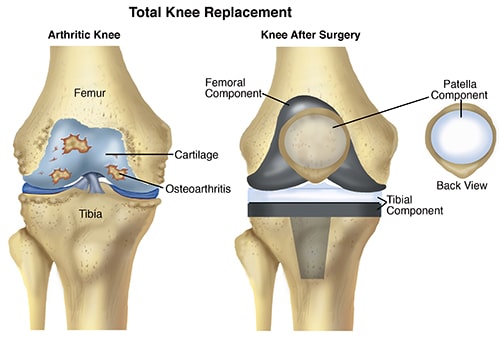What are the Factors that Influence the Cost of Knee Replacement Surgery?

What are the Factors that Influence the Cost of Knee Replacement Surgery?
Knees are the anchors of our body. Due to reasons like ageing and other factors the knee joint may face issues. When visiting an Orthopaedic doctor may prescribe Knee replacement surgery, which is a standard procedure to relieve pain and restore function in severely diseased knee joints. However, the cost of this surgery can vary widely depending on several factors. This article explores the key factors that influence the price of knee replacement surgery in India, helping patients understand what to expect and how to plan for this critical medical procedure.
Understanding Knee Replacement Surgery
The Total Knee Replacement surgery, also known as Knee Arthroplasty, involves replacing a damaged knee joint with an artificial implant. This surgery is typically recommended for patients with severe arthritis or significant knee injuries that impair mobility and cause chronic pain.
Types of Knee Replacement Surgery
- Total Knee Replacement (TKR): Involves replacing the entire knee joint.
- Partial Knee Replacement (PKR): Involves replacing only the damaged part of the knee joint.
- Bilateral Knee Replacement: Both knees are replaced simultaneously or in two separate surgeries.
Factors Influencing the Cost of Knee Replacement Surgery in India
Type of Surgery
The type of knee replacement surgery significantly affects the cost. Total knee replacement surgery in India is generally more expensive than partial knee replacement due to the extent of the procedure and the type of implants used. Bilateral knee replacement will further increase the cost as it involves two surgeries.
Choice of Hospital
The choice of hospital plays a crucial role in determining the cost. Hospitals in metropolitan cities like the BLK-MAX Super Speciality Hospitals with advanced facilities and experienced surgeons tend to charge more. The hospital’s reputation and accreditation also impact the overall cost.
Factors to Consider:
- Location of the hospital
- Accreditation and reputation
- Availability of advanced medical facilities
- Quality of postoperative care
Surgeon’s Expertise
The experience and expertise of the surgeon performing knee replacement surgery in India are critical factors influencing the cost. Highly experienced and renowned surgeons may charge higher fees due to their expertise and successful track record.
Type of Implant
The type and quality of the implant used in the surgery significantly affect the cost. There are various types of implants, including:
- Metal-on-Plastic: The most common and cost-effective option.
- Ceramic-on-Ceramic: More durable but also more expensive.
- Metal-on-Metal: Less commonly used due to potential complications.
Preoperative and Postoperative Care
Preoperative tests, consultations, and postoperative rehabilitation are essential for knee replacement surgery. These services add to the overall cost and include:
- Diagnostic Tests: X-rays, MRI scans, and blood tests.
- Consultations: Multiple visits to the surgeon and other specialists.
- Rehabilitation: Physical therapy sessions post-surgery to aid recovery.
Length of Hospital Stay
The duration of the hospital stay impacts the total cost. A more extended stay due to complications or slower recovery will increase the expenses. Hospitals charge for room rent, nursing care, and other services provided during the stay.
Medical Insurance
The extent of coverage provided by medical insurance can significantly affect out-of-pocket expenses. It is crucial to check with the insurance provider about what aspects of the surgery are covered and to what extent.
Geographical Location
The geographical location within India can influence the cost of knee replacement surgery. Metropolitan areas tend to have higher costs compared to smaller cities or towns due to the availability of advanced facilities and higher living expenses.
Additional Medical Conditions
Patients with additional medical conditions such as diabetes, hypertension, or heart disease may require special care and monitoring, adding to the overall cost of the surgery.
Customisation and Advanced Techniques
Some patients may require customised implants or advanced surgical techniques like robotic-assisted surgery. These options provide better outcomes but at a higher cost.
Cost Breakdown of Knee Replacement Surgery in India
To give a clearer picture, here’s a typical cost distribution for knee replacement surgery in India:
- Surgeon’s Fee: 20-30%
- Implant Cost: 30-40%
- Hospital Charges: 20-30%
- Preoperative and Postoperative Care: 10-20%
- Miscellaneous Costs: 5-10%
How to Manage the Cost of Knee Replacement Surgery
Research and Compare
Patients should research and compare different hospitals and surgeons. They should look for hospitals that offer quality care at a reasonable cost and have experienced surgeons.
Insurance Coverage
Verify the extent of insurance coverage for knee replacement surgery. Ensure that the policy covers the major components of the surgery to reduce out-of-pocket expenses.
Medical Loans and Financing
Consider medical loans or financing options provided by banks and healthcare institutions. These can help spread the cost over a manageable period.
Government Schemes
Explore government healthcare schemes that may subsidise the cost of knee replacement surgery for eligible patients.
Conclusion
Understanding the factors that influence the cost of knee replacement surgery in India can help patients make informed decisions and better prepare for the procedure. Each factor is crucial in determining the overall cost, from the type of surgery and choice of hospital to the surgeon’s expertise and insurance coverage. By carefully considering these factors and exploring financial options, patients can ensure they receive the best possible care without undue financial strain.
By understanding the comprehensive aspects affecting the cost, you can take informed steps and plan effectively for your knee replacement surgery. Prioritising your health and financial planning will help you confidently manage this crucial medical decision.




